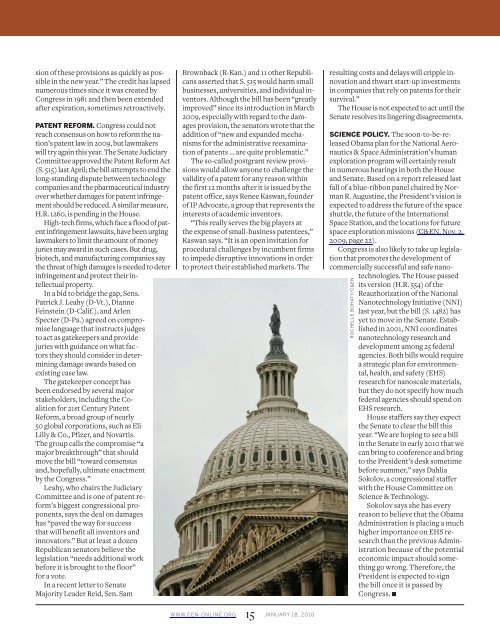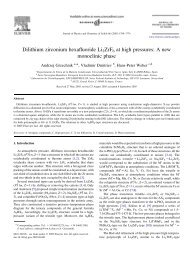Chemical & Engineering News Digital Edition - January 18, 2010
Chemical & Engineering News Digital Edition - January 18, 2010
Chemical & Engineering News Digital Edition - January 18, 2010
You also want an ePaper? Increase the reach of your titles
YUMPU automatically turns print PDFs into web optimized ePapers that Google loves.
sion of these provisions as quickly as possible<br />
in the new year.” The credit has lapsed<br />
numerous times since it was created by<br />
Congress in 1981 and then been extended<br />
after expiration, sometimes retroactively.<br />
PATENT REFORM. Congress could not<br />
reach consensus on how to reform the nation’s<br />
patent law in 2009, but lawmakers<br />
will try again this year. The Senate Judiciary<br />
Committee approved the Patent Reform Act<br />
(S. 515) last April; the bill attempts to end the<br />
long-standing dispute between technology<br />
companies and the pharmaceutical industry<br />
over whether damages for patent infringement<br />
should be reduced. A similar measure,<br />
H.R. 1260, is pending in the House.<br />
High-tech firms, which face a flood of patent<br />
infringement lawsuits, have been urging<br />
lawmakers to limit the amount of money<br />
juries may award in such cases. But drug,<br />
biotech, and manufacturing companies say<br />
the threat of high damages is needed to deter<br />
infringement and protect their intellectual<br />
property.<br />
In a bid to bridge the gap, Sens.<br />
Patrick J. Leahy (D-Vt.), Dianne<br />
Feinstein (D-Calif.), and Arlen<br />
Specter (D-Pa.) agreed on compromise<br />
language that instructs judges<br />
to act as gatekeepers and provide<br />
juries with guidance on what factors<br />
they should consider in determining<br />
damage awards based on<br />
existing case law.<br />
The gatekeeper concept has<br />
been endorsed by several major<br />
stakeholders, including the Coalition<br />
for 21st Century Patent<br />
Reform, a broad group of nearly<br />
50 global corporations, such as Eli<br />
Lilly & Co., Pfizer, and Novartis.<br />
The group calls the compromise “a<br />
major breakthrough” that should<br />
move the bill “toward consensus<br />
and, hopefully, ultimate enactment<br />
by the Congress.”<br />
Leahy, who chairs the Judiciary<br />
Committee and is one of patent reform’s<br />
biggest congressional proponents,<br />
says the deal on damages<br />
has “paved the way for success<br />
that will benefit all inventors and<br />
innovators.” But at least a dozen<br />
Republican senators believe the<br />
legislation “needs additional work<br />
before it is brought to the floor”<br />
for a vote.<br />
In a recent letter to Senate<br />
Majority Leader Reid, Sen. Sam<br />
Brownback (R-Kan.) and 11 other Republicans<br />
asserted that S. 515 would harm small<br />
businesses, universities, and individual inventors.<br />
Although the bill has been “greatly<br />
improved” since its introduction in March<br />
2009, especially with regard to the damages<br />
provision, the senators wrote that the<br />
addition of “new and expanded mechanisms<br />
for the administrative reexamination<br />
of patents … are quite problematic.”<br />
The so-called postgrant review provisions<br />
would allow anyone to challenge the<br />
validity of a patent for any reason within<br />
the first 12 months after it is issued by the<br />
patent office, says Renee Kaswan, founder<br />
of IP Advocate, a group that represents the<br />
interests of academic inventors.<br />
“This really serves the big players at<br />
the expense of small-business patentees,”<br />
Kaswan says. “It is an open invitation for<br />
procedural challenges by incumbent firms<br />
to impede disruptive innovations in order<br />
to protect their established markets. The<br />
WWW.CEN-ONLINE.ORG 15 JANUARY <strong>18</strong>, <strong>2010</strong><br />
resulting costs and delays will cripple innovation<br />
and thwart start-up investments<br />
in companies that rely on patents for their<br />
survival.”<br />
The House is not expected to act until the<br />
Senate resolves its lingering disagreements.<br />
SCIENCE POLICY. The soon-to-be-released<br />
Obama plan for the National Aeronautics<br />
& Space Administration’s human<br />
exploration program will certainly result<br />
in numerous hearings in both the House<br />
and Senate. Based on a report released last<br />
fall of a blue-ribbon panel chaired by Norman<br />
R. Augustine, the President’s vision is<br />
expected to address the future of the space<br />
shuttle, the future of the International<br />
Space Station, and the locations for future<br />
space exploration missions (C&EN, Nov. 2,<br />
2009, page 22).<br />
Congress is also likely to take up legislation<br />
that promotes the development of<br />
commercially successful and safe nanotechnologies.<br />
The House passed<br />
its version (H.R. 554) of the<br />
Reauthorization of the National<br />
Nanotechnology Initiative (NNI)<br />
last year, but the bill (S. 1482) has<br />
yet to move in the Senate. Established<br />
in 2001, NNI coordinates<br />
nanotechnology research and<br />
development among 25 federal<br />
agencies. Both bills would require<br />
a strategic plan for environmental,<br />
health, and safety (EHS)<br />
research for nanoscale materials,<br />
but they do not specify how much<br />
federal agencies should spend on<br />
EHS research.<br />
House staffers say they expect<br />
the Senate to clear the bill this<br />
year. “We are hoping to see a bill<br />
in the Senate in early <strong>2010</strong> that we<br />
can bring to conference and bring<br />
to the President’s desk sometime<br />
before summer,” says Dahlia<br />
Sokolov, a congressional staffer<br />
with the House Committee on<br />
Science & Technology.<br />
Sokolov says she has every<br />
reason to believe that the Obama<br />
Administration is placing a much<br />
higher importance on EHS research<br />
than the previous Administration<br />
because of the potential<br />
economic impact should something<br />
go wrong. Therefore, the<br />
President is expected to sign<br />
the bill once it is passed by<br />
Congress. ■<br />
ROCHELLE BOHATY/C&EN




